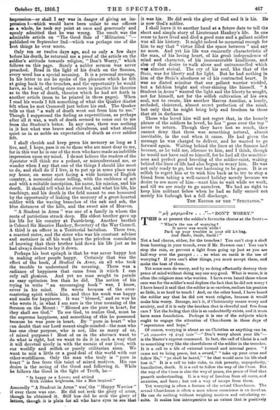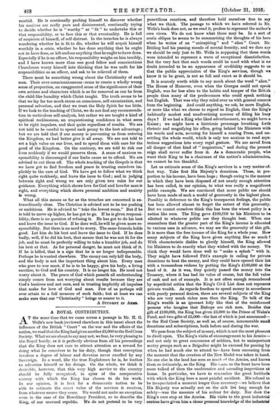" peptp,vare . . ."—" DON'T WORRY." T HIS is at
present the soldier's favourite chorus at the front:-
" What's the use of worrying ? It never was worth while Pack up your troubles in your old kit-bag, And Smile, Smile, Smile 1 "
Not a bad chorus, either, for the trenches 1 You can't stop a shell from bursting in your trench, even if Mr. Rawson can ! You can't stop the rain, or prevent a light from going up just as you are half-way over the parapet . . . so what on earth is the use of worrying ? If you can't alter things, you must accept them, and make the best of them.
Yet some men do worry, and by so doing effectually destroy their peace of mind without doing any one any good. What is worse, it is often the religious man who worries. I have even heard those whose care was for the soldier's soul deplore the fact that he did not worry I I have heard it said that the soldier is so careless, realizes his position so little, is so hard to touch ! And, on the other hand, I have heard the soldier say that he did not want religion, because it would make him worry. Strange, isn't it, if Christianity means worry and anxiety, and if it is only the heathen that is cheerful and free from care ? Yet the feeling that this is so •undoubtedly exists, and it must have some foundation. Perhaps it is one of the subjects which ought to engage the attention of Churchmen in these days of " repentance and hope."
Of course, worrying is about as un-Christlan as anything can be. " pa peptAvare ri3 ,frexTi 6ezy "—" Don't worry about your life"—
is the Master's express command. In fact, the call of Christ is a call
to something very like the cheerfulness of the soldier in the trenches. It is a call to a life of external turmoil and internal peace. " I
came not to bring peace, but a sword," " take up your cross and follow Me," " ye shall be hated," " he that would save his life shall lose it." It is a call to take risks, to risk poverty, unpopularity, • humiliation, death. It is a call to follow the way of the Cross. But the way of the Cross is also the way of peace, the peace of God that
passeth understanding. It is a way of freedom from all cares, and anxieties, and fears ; but not a way of escape from them.
Yet worrying is often a feature of the actual Churchman. The actual Churchman is often a man whose conscience is an incubus. He can do nothing without weighing motives and calculating re- suite. It makes him introspective to an extent that is positively
morbid. He is continually probing himself to discover whether his motives are really pure and disinterested, continually trying to decide whether he is " worthy " or " fit " to undertake this or that responsibility, or to face this or that eventuality. He is full of suspicion of himself, of self-distrust. In the trenches he is always wondering whether he is fit to die, whether he will acquit himself worthily in a crisis, whether he has done anything that he ought not to have done, or left undone anything that he ought to have done. Especially if he is an officer, his responsibility weighs on him terribly, and I have known more than one good fellow and conscientious Churchman worry himself into thinking that he was unfit for his responsibilities as an officer, and ask to be relieved of them.
There must be something wrong about the Christianity of such men. Their over-conscientiousness teems to create a wholly wrong sense of proportion, an exaggerated sense of the significance of their own actions and characters which is as far removed as can be from the child-like humility which Christ taught. The truth seems to be that we lay far too much stress on conscience, self-examination, and personal salvation, and that we trust the Holy Spirit far too little. If we look to the teaching of Christ, we do not find any recommenda- tion to meticulous self-analysis, but rather we are taught a kind of spiritual recklessness, an unquestioning confidence in what seem to be right impulses, and that quite regardless of results. We are not told to be careful to spend each penny to the best advantage ; but we are told that if our money is preventing us from entering the Kingdom, we had better give it all away. We are not told to set a high value on our lives, and to spend them with care for the good of the Kingdom. On the contrary, we are told to risk our lives recklessly if we would preserve them. A sense of anxious re- sponsibility is discouraged if our limbs cause us to offend. We are advised to cut them off. The whole teaching of the Gospels is that we have got to find freedom and peace in trusting ourselves im- plicitly to the care of God. We have got to follow what we think right quite recklessly, and leave the issue to God ; and in judging between right and wrong we are only given two rules for our guidance. Everything which shows love for God and love for man is right, and everything which shows personal ambition and anxiety is wrong.
What all this means as far as the trenches are concerned is ex- traordinarily clear. The Christian is advised not to be too pushing or ambitious. He is advised to " take the lowest room." But if he is told to move up higher, he has got to go. If he is given responsi- bility, there is no question of refusing it. He has got to do his best and leave the issue to God. If he does well, he will be given more re- sponsibility. But there is no need to worry. The same formula bolds good. Let him do his best and leave the issue to God. If he does badly, well, if he did his best, that means that he was not fit for the job, and he must be perfectly willing to take a humbler job, and do his best at that. As for personal danger, he must not think of it. If he is killed, that is a sign that he is no longer indispensable. Perhaps he is wanted elsewhere. The enemy can only kill the body, and the body is not the important thing about him. Every man who goes to war must, if he is to be happy, give his body, a living sacrifice, to God and his country. It is no longer his. He need not worry about it. The peace of God which passeth all understanding simply comes from not worrying about results because they are God's business and not ours, and in trusting implicitly all impulses that make for love of God and man. Few of us perhaps will ever attain to a full measure of such faith; but at least we can make sure that our "Christianity" brings us nearer to it.
A STUDENT IN ARMS.



































 Previous page
Previous page